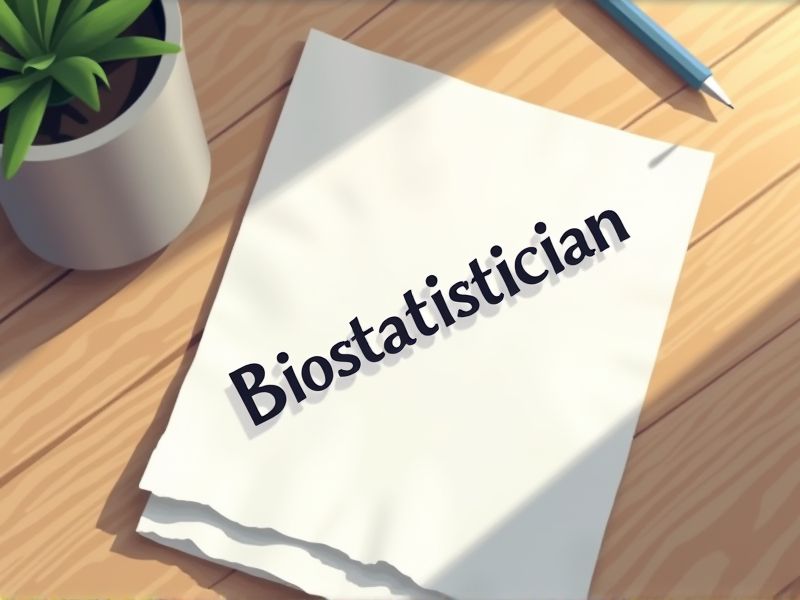
Biostatistics requires specific skills in analyzing complex biological data, which certifications often validate. Acquiring these credentials ensures that professionals are equipped with the latest methodologies and technologies. Employers favor certified biostatisticians as they demonstrate proven expertise and commitment to the field. Below are key certifications essential for a career in biostatistics.
SAS Certified Specialist: Base Programming Using SAS 9.4
Obtaining the SAS Certified Specialist in Base Programming Using SAS 9.4 certification equips biostatisticians with essential data manipulation and analysis skills crucial for handling large health datasets. Proficiency in SAS programming enhances a biostatistician's ability to efficiently manage and analyze clinical trial data. Employers often prioritize candidates with SAS certification as it demonstrates proven expertise in statistical analysis, thereby increasing job prospects. The certification ensures that biostatisticians can implement reproducible research practices, critical for ensuring the validity and reliability of health studies.
American Statistical Association Accredited Professional Statistician
The accreditation by the American Statistical Association serves as a reliable validation of a biostatistician's competence, ensuring they possess a comprehensive understanding of statistical methodologies. This credential enhances their ability to make informed decisions in complex health-related data analysis, crucial for medical research and public health efforts. By achieving accreditation, a biostatistician demonstrates commitment to continued education and adherence to professional standards, increasing trust among employers and peers. The accreditation can also improve career prospects as organizations increasingly seek credentialed professionals to ensure high-quality research outcomes.
Certified Clinical Data Manager (CCDM)
Having a Certified Clinical Data Manager ensures that data is collected, cleaned, and validated, providing reliable datasets for biostatistical analysis. Accurate data management directly influences the quality of statistical models, leading to valid conclusions and robust decision-making. Efficient data handling by a CCDM reduces errors, minimizing risks in clinical research outcomes. Their expertise supports compliance with regulatory requirements, which is crucial for maintaining the integrity of biostatistical research.
Certified Health Data Analyst (CHDA)
Biostatisticians collaborate with certified health data analysts to ensure accurate interpretation and validation of complex health data sets. CHDAs bring expertise in data management and analytics, enhancing the quality of statistical models used in research. Improved data accuracy and analysis result in more reliable conclusions, directly impacting public health strategies. Their collaboration helps in the seamless integration and application of varied health data sources, facilitating comprehensive biostatistical research.
Certified Clinical Research Professional (CCRP)
A Biostatistician working in clinical research must interpret complex data sets, necessitating the rigor and standards that come with CCRP certification. The certification ensures that the biostatistician is knowledgeable about regulatory guidelines and good clinical practice, reducing the risk of data errors and regulatory non-compliance. Certified professionals are better equipped to effectively communicate statistical findings within interdisciplinary teams, enhancing collaborative efforts. The CCRP credential can also increase the biostatistician's credibility, potentially leading to more trust and responsibility within research projects.
R Programming Certification
Obtaining an R Programming Certification equips biostatisticians with the skills necessary for advanced data analysis and statistical computing. This certification validates proficiency in handling large datasets and implementing complex statistical techniques relevant to biomedical research. Employers in the healthcare and pharmaceutical industries often seek candidates with R expertise to streamline data-driven decision-making processes. The credential also demonstrates commitment to staying current with industry-standard tools, enhancing career prospects and professional credibility.
Microsoft Certified: Data Analyst Associate
Acquiring the Microsoft Certified: Data Analyst Associate credential enhances a biostatistician's capability to efficiently manage and analyze large datasets, a common requirement in the field. The certification confirms proficiency in Power BI, which is crucial for visualizing complex statistical outcomes in a comprehensible manner. As biostatisticians often collaborate with cross-functional teams, demonstrating certified expertise builds credibility and facilitates effective communication of data-driven insights. With the healthcare industry's increasing reliance on data analytics, possessing this certification ensures competitive advantage and alignment with industry standards.
Certificate in Biostatistics and Epidemiology
Pursuing a Certificate in Biostatistics and Epidemiology equips a biostatistician with essential skills to analyze and interpret complex health data effectively. By obtaining specialized knowledge, professionals can better design and assess public health research, which influences health policies and practices. The certificate program often provides hands-on training with statistical software, crucial for practical data analysis in real-world scenarios. As health data continues to grow in volume and complexity, having formal recognition enhances a biostatistician's credibility and employment prospects in various healthcare sectors.
IBM Data Science Professional Certificate
Biostatisticians require proficiency in data handling and analysis, and the IBM Data Science Professional Certificate equips them with essential skills in Python, SQL, and data visualization. The curriculum covers critical machine learning techniques, allowing biostatisticians to enhance predictive modeling in medical research. IBM's recognition and industry relevance of this certification can boost a biostatistician's credibility in data-driven environments. The program's focus on practical, hands-on projects strengthens a biostatistician's ability to tackle real-world health data challenges effectively.
Coursera Machine Learning Specialization Certificate
The Coursera Machine Learning Specialization Certificate equips biostatisticians with advanced data analysis tools, enabling them to handle large and complex datasets in biomedical research more efficiently. Mastery of machine learning techniques through this program directly enhances predictive modeling and pattern recognition, crucial skills in identifying health trends and outcomes. A recognized certification in machine learning increases a biostatistician's competitiveness in the job market, aligning with the industry's shift towards data-driven decision-making. The program's emphasis on practical applications and real-world projects ensures that professionals can immediately apply their learnings to improve research methodologies and outcomes in biostatistics.
Summary
When you obtain certifications as a biostatistician, your credibility and expertise in the field increase significantly. This often leads to enhanced career opportunities and potential for higher earnings. Employers tend to favor candidates with certified skills, viewing them as more competent and knowledgeable. Gaining certifications can also expand your professional network, connecting you with industry leaders and peers.
